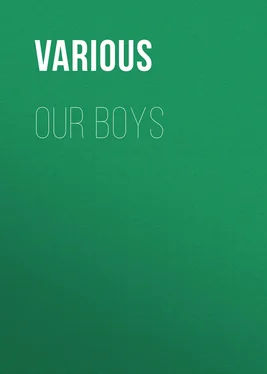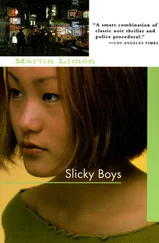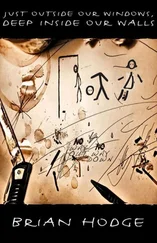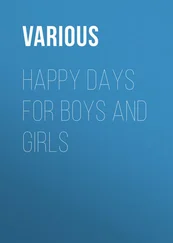Various - Our Boys
Здесь есть возможность читать онлайн «Various - Our Boys» — ознакомительный отрывок электронной книги совершенно бесплатно, а после прочтения отрывка купить полную версию. В некоторых случаях можно слушать аудио, скачать через торрент в формате fb2 и присутствует краткое содержание. Жанр: Детские стихи, foreign_antique, foreign_prose, foreign_children, на английском языке. Описание произведения, (предисловие) а так же отзывы посетителей доступны на портале библиотеки ЛибКат.
- Название:Our Boys
- Автор:
- Жанр:
- Год:неизвестен
- ISBN:нет данных
- Рейтинг книги:4 / 5. Голосов: 1
-
Избранное:Добавить в избранное
- Отзывы:
-
Ваша оценка:
- 80
- 1
- 2
- 3
- 4
- 5
Our Boys: краткое содержание, описание и аннотация
Предлагаем к чтению аннотацию, описание, краткое содержание или предисловие (зависит от того, что написал сам автор книги «Our Boys»). Если вы не нашли необходимую информацию о книге — напишите в комментариях, мы постараемся отыскать её.
Our Boys — читать онлайн ознакомительный отрывок
Ниже представлен текст книги, разбитый по страницам. Система сохранения места последней прочитанной страницы, позволяет с удобством читать онлайн бесплатно книгу «Our Boys», без необходимости каждый раз заново искать на чём Вы остановились. Поставьте закладку, и сможете в любой момент перейти на страницу, на которой закончили чтение.
Интервал:
Закладка:
Various
Our Boys / Entertaining Stories by Popular Authors
The Cat-tail Arrow
Little Sammie made a bow,
Well indeed he loved to whittle,
Shaped it like the half of O—
How he could I scarcely know,
For his fingers were so little.
As he whittled came a sigh:
"If I only had an arrow;
Something light enough to fly
To the tree-tops or the sky!
Then I'd have such fun tomorrow."
Then he thought of all the slim
Things that grow—the hazel bushes,
Willow branches, poplars trim—
And yet nothing suited him
Till he chanced to think of rushes.
He knew well a quiet pool
Where he always paused a minute
On his way to district school,
Just to see the waters cool
And his own bright face within it.
There the cat-tails thickly grew,
With their heads so brown and furry;
They were straight and slender too,
Plenty strong enough he knew,
And he sought them in a hurry.
Such an arrow as he wrought—
Almost passed a boy's believing.
When he drew the bow-string taut,
Out of sight and quick as thought
Up it went, the blue air cleaving.
Who was Sammie, would you know?
It was grandpa—he was little
Nearly eighty years ago;
But 'tis no doubt as fine a bow
As the best he still could whittle.
HE COULDN'T SAY NO
It was sad and it was strange!
He just was full of knowledge,
His studies swept the whole broad range
Of High School and of College;
He read in Greek and Latin too,
Loud Sanscrit he could utter,
But one small thing he couldn't do
That comes as pat to me and you
As eating bread and butter:
He couldn't say "No!" He couldn't say "No!"
I'm sorry to say it was really so!
He'd diddle, and dawdle, and stutter, but oh!
When it came to the point he could never say "No!"
Geometry he knew by rote,
Like any Harvard Proctor;
He'd sing a fugue out, note by note;
Knew Physics like a Doctor;
He spoke in German and in French;
Knew each Botanic table;
But one small word that you'll agree
Comes pat enough to you and me,
To speak he was not able:
For he couldn't say "No!" He couldn't say "No!"
'Tis dreadful, of course, but 'twas really so.
He'd diddle, and dawdle, and stutter, but oh!
When it came to the point he could never say "No!"
And he could fence, and swim, and float,
And use the gloves with ease too,
Could play base ball, and row a boat,
And hang on a trapeze too;
His temper was beyond rebuke,
And nothing made him lose it;
His strength was something quite superb,
But what's the use of having nerve
If one can never use it?
He couldn't say "No!" He couldn't say "No!"
If one asked him to come, if one asked him to go,
He'd diddle, and dawdle, and stutter, but oh!
When it came to the point he could never say "No!"
When he was but a little lad,
In life's small ways progressing,
He fell into this habit bad
Of always acquiescing;
'Twas such an amiable trait,
To friend as well as stranger,
That half unconsciously at last
The custom held him hard and fast
Before he knew the danger,
And he couldn't say "No!" He couldn't say "No!"
To his prospects you see 'twas a terrible blow.
He'd diddle, and dawdle, and stutter, but oh!
When it came to the point he could never say "No!"
And so for all his weary days
The best of chances failed him;
He lived in strange and troublous ways
And never knew what ailed him;
He'd go to skate when ice was thin;
He'd join in deeds unlawful,
He'd lend his name to worthless notes,
He'd speculate in stocks and oats;
'Twas positively awful,
For he couldn't say "No!" He couldn't say "No!"
He would veer like a weather-cock turning so slow;
He'd diddle, and dawdle, and stutter, but oh!
When it came to the point he could never say "No!"
Then boys and girls who hear my song,
Pray heed its theme alarming:
Be good, be wise, be kind, be strong—
These traits are always charming,
But all your learning, all your skill
With well-trained brain and muscle,
Might just as well be left alone,
If you can't cultivate backbone
To help you in life's tussle,
And learn to say "No!" Yes, learn to say "No!"
Or you'll fall from the heights to the rapids below!
You may waver, and falter, and tremble, but oh!
When your conscience requires it, be sure and shout "No!"
THE CHRISTMAS MONKS
All children have wondered unceasingly from their very first Christmas up to their very last Christmas, where the Christmas presents come from. It is very easy to say that Santa Claus brought them. All well regulated people know that, of course; about the reindeer, and the sledge, and the pack crammed with toys, the chimney, and all the rest of it—that is all true, of course, and everybody knows about it; but that is not the question which puzzles. What children want to know is, where do these Christmas presents come from in the first place? Where does Santa Claus get them? Well, the answer to that is, In the garden of the Christmas Monks . This has not been known until very lately; that is, it has not been known till very lately except in the immediate vicinity of the Christmas Monks. There, of course, it has been known for ages. It is rather an out-of-the-way place; and that accounts for our never hearing of it before.
The Convent of the Christmas Monks is a most charmingly picturesque pile of old buildings; there are towers and turrets, and peaked roofs and arches, and everything which could possibly be thought of in the architectural line, to make a convent picturesque. It is built of graystone; but it is only once in a while that you can see the graystone, for the walls are almost completely covered with mistletoe and ivy and evergreen. There are the most delicious little arched windows with diamond panes peeping out from the mistletoe and evergreen, and always at all times of the year, a little Christmas wreath of ivy and holly-berries is suspended in the centre of every window. Over all the doors, which are likewise arched, are Christmas garlands, and over the main entrance Merry Christmas in evergreen letters.
The Christmas Monks are a jolly brethren; the robes of their order are white, gilded with green garlands, and they never are seen out at any time of the year without Christmas wreaths on their heads. Every morning they file in a long procession into the chapel to sing a Christmas carol; and every evening they ring a Christmas chime on the convent bells. They eat roast turkey and plum pudding and mince-pie for dinner all the year round; and always carry what is left in baskets trimmed with evergreen to the poor people. There are always wax candles lighted and set in every window of the convent at nightfall; and when the people in the country about get uncommonly blue and down-hearted, they always go for a cure to look at the Convent of the Christmas Monks after the candles are lighted and the chimes are ringing. It brings to mind things which never fail to cheer them.
But the principal thing about the Convent of the Christmas Monks is the garden; for that is where the Christmas presents grow. This garden extends over a large number of acres, and is divided into different departments, just as we divide our flower and vegetable gardens; one bed for onions, one for cabbages, and one for phlox, and one for verbenas, etc.
Every spring the Christmas Monks go out to sow the Christmas-present seeds after they have ploughed the ground and made it all ready.
Читать дальшеИнтервал:
Закладка:
Похожие книги на «Our Boys»
Представляем Вашему вниманию похожие книги на «Our Boys» списком для выбора. Мы отобрали схожую по названию и смыслу литературу в надежде предоставить читателям больше вариантов отыскать новые, интересные, ещё непрочитанные произведения.
Обсуждение, отзывы о книге «Our Boys» и просто собственные мнения читателей. Оставьте ваши комментарии, напишите, что Вы думаете о произведении, его смысле или главных героях. Укажите что конкретно понравилось, а что нет, и почему Вы так считаете.




![Various Various - Selected List of Nimmo, Hay, & Mitchell's Publications [1890]](/books/571841/various-various-selected-list-of-nimmo-hay-mit-thumb.webp)







